

SPJ Code of Ethics. SPJ Code of Ethics Revised September 6, 2014 at 4:49 p.m.
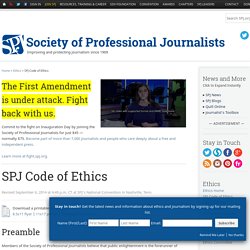
CT at SPJ’s National Convention in Nashville, Tenn. Download a printable copy [PDF]:8.5x11 flyer | 11x17 poster | Two-sided bookmark Preamble Members of the Society of Professional Journalists believe that public enlightenment is the forerunner of justice and the foundation of democracy. The Society declares these four principles as the foundation of ethical journalism and encourages their use in its practice by all people in all media.
The SPJ Code of Ethics is a statement of abiding principles supported by explanations and position papers that address changing journalistic practices. For an expanded explanation, please follow this link. Supporting documents Click or tap the arrow icon anywhere it appears in the code to explore additional resources the Society’s ethics committee compiled to help people with day-to-day ethics decisions. Additional applications – Case Studies – Committee Position Papers Translations. Confirmation Bias in Conservative "Journalism" Is Ethical Journalism Simply Objective Reporting? Media Bias Basics. Interviews - Can Journalists Be Truly Objective? Commentator; former adviser to President Nixon Patrick Buchanan I'm talking about conservative commentators.

But sure they do. Objectivity and Fairness - Objectivity and fairness in news stories. You hear it all the time – reporters should be objective and fair.
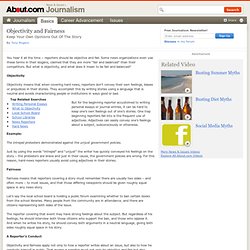
Some news organizations even use these terms in their slogans, claimed that they are more “fair and balanced” than their competitors. Bias Or Balance? Media Wrestle With Faltering Trust. UNT talk-Objectivity in Journalism. University of North Texas Nature Writing Symposium talk: “Changing the World One Story at a Time” April 2007 Copyright © 2007 Wendee Holtcamp – bohemian@wendeeholtcamp.com Suppose you are given a bucket of water.
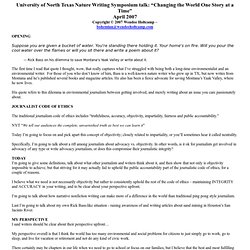
You're standing there holding it. -- Rick Bass on his dilemma to save Montana's Yaak Valley or write about it. The first time I read that quote I thought, wow, that really captures what I’ve struggled with being both a long-time environmentalist and an environmental writer. His quote refers to this dilemma in environmental journalism between getting involved, and merely writing about an issue you care passionately about. The traditional journalism code of ethics includes “truthfulness, accuracy, objectivity, impartiality, fairness and public accountability.” NYT “We tell our audiences the complete, unvarnished truth as best we can learn it” Specifically, I’m going to talk about a rift among journalists about advocacy vs. objectivity.
“But now, says the Once-ler, Now that you´re here, Rethinking Journalism Ethics, Objectivity in the Age of Social Media. In response to the rapidly changing media environment, many schools and academic programs are offering novel approaches to journalism education.
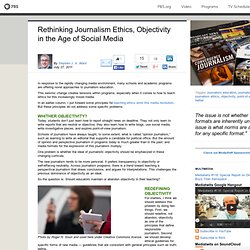
This seismic change creates tensions within programs, especially when it comes to how to teach ethics for this increasingly mixed media. In an earlier column, I put forward some principles for teaching ethics amid this media revolution. But these principles do not address some specific problems. Whither objectivity? Today, students don’t just learn how to report straight news on deadline.
Schools of journalism have always taught, to some extent, what is called “opinion journalism,” such as learning to write an editorial that supports a candidate for political office. One problem is whether the ideal of journalistic objectivity should be emphasized in these changing curricula. The new journalism tends to be more personal.
So the question is: Should educators maintain or abandon objectivity in their teaching? Photo by Roger H. Fear of bias can weaken journalism. Principles of Journalism. The first three years of the Project’s work involved listening and talking with journalists and others around the country about what defines the work.

What emerged out of those conversations are the following nine core principles of journalism: 1. Journalism’s first obligation is to the truth Democracy depends on citizens having reliable, accurate facts put in a meaningful context. Journalism does not pursue truth in an absolute or philosophical sense, but it can–and must–pursue it in a practical sense. 2. While news organizations answer to many constituencies, including advertisers and shareholders, the journalists in those organizations must maintain allegiance to citizens and the larger public interest above any other if they are to provide the news without fear or favor. 3. Journalists rely on a professional discipline for verifying information.
Objectivity (journalism) Journalistic objectivity is a significant principle of journalistic professionalism.
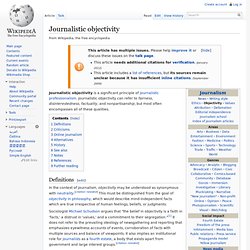
Journalistic objectivity can refer to fairness, disinterestedness, factuality, and nonpartisanship, but most often encompasses all of these qualities. Definitions[edit] Sociologist Michael Schudson argues that "the belief in objectivity is a faith in 'facts,' a distrust in 'values,' and a commitment to their segregation. "[1] It does not refer to the prevailing ideology of newsgathering and reporting that emphasizes eyewitness accounts of events, corroboration of facts with multiple sources and balance of viewpoints. Criticisms[edit] Advocacy journalists and civic journalists criticize the understanding of objectivity as neutrality or nonpartisanship, arguing that it does a disservice to the public because it fails to attempt to find truth.
An Argument Why Journalists Should Not Abandon Objectivity. In “Losing the News: The Future of the News that Feeds Democracy,” published by Oxford University Press, Alex S.
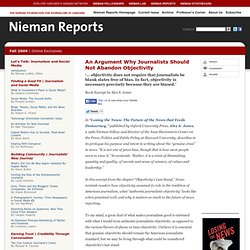
Jones, a 1982 Nieman Fellow and director of the Joan Shorenstein Center on the Press, Politics and Public Policy at Harvard University, describes in its prologue his purpose and intent in writing about the “genuine crisis” in news. “It is not one of press bias, though that is how most people seem to view it,” he contends. “Rather, it is a crisis of diminishing quantity and quality, of morale and sense of mission, of values and leadership.”